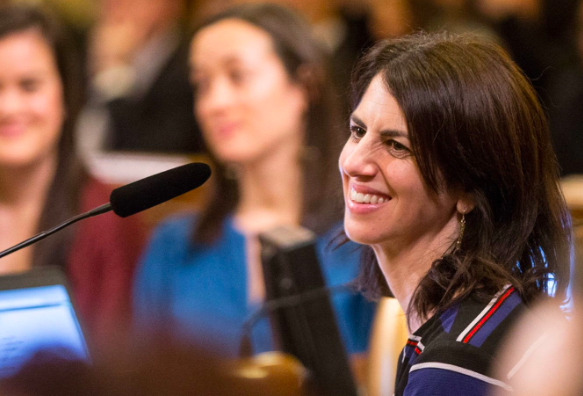I’ve been covering the city’s relations with PG&E for more than 40 years, and I’ve never seen anything remotely like the hearing that the Land Use and Transportation Committee held this week.
The immediate issue was PG&E’s refusal to connect city projects to the grid unless San Francisco paid a huge fee for very expensive, and often unnecessary, equipment.

But Sup. Hillary Ronen took on a PG&E vice president in a way that showed exactly how the company is trying to squeeze money out of the city and prevent public-power competition.
And the PG&E exec, Aaron Johnson, basically said that the city could either pay its huge fees or let the company take over providing electricity to city projects, including streetlights.
In other words: Screw you, San Francisco.
In essence, he said that the policy, going back almost 100 years, of allowing the city to deliver its own cheap, carbon-free public power to municipal facilities over PG&E lines is ending.
Instead, PG&E wants to treat San Francisco the same way it treats other large customers, and require massive transformers, at least 720 square feet, for every single interconnection.
Since the city uses PG&E’s lines to deliver power to its streetlights, for example, that would mean a transformer—in some cases more than one—on pretty much every block of the city. As Ronen said, there’s just not space on the streets for that.
And the cost could run into the hundreds of millions of dollars.
Ronen interrogated Johnson about this and asked why the city would need all of that equipment. Johnson tried to say it was about “safety.”
But, Ronen pointed out, the current system has been working for almost a century, and there has never been a safety issue with the streetlights and their electric power connections.
The issue here is what’s called primary and secondary power. Primary power comes in at very high voltage, and you might need that to run, for example, San Francisco General Hospital. But you can’t plug a streetlight or a bathroom for Muni drivers that has one light bulb into primary power; you need a transformer to step it down to household current.
PG&E now wants San Francisco to accept only primary power for its public services, which means every connection needs a big expensive piece of equipment.
But under questioning, Johnson got to the real point: San Francisco has been paying the equivalent of wholesale rates for power, and PG&E wants to charge retail.
“The city wants us to provide retail services at wholesale rates,” Johnson said.
PG&E, of course, would be happy to sell its own retail power to the city for the streetlights—in effect blocking San Francisco from operating as a public-power utility.
Well: I don’t even know where to start.
First of all, PG&E has been operating illegally in San Francisco since the 1920s. You can read all the history here. Under the Raker Act of 1913, San Francisco is required to operate its own public-power system to serve the people of the city. That law was specifically designed to keep PG&E from getting a private-power beachhead in Northern California.
San Francisco is a unique market: The SF Public Utilities Commission generates power at the Hetch Hetchy dam, but thanks to a historical scandal, never ran its own power lines across the Bay or set up a local grid. So they only way to deliver that power to customers in by in essence renting PG&E’s lines.
And since PG&E owns the delivery system, the company can, in the words of Ronen, “hold the city hostage.”
Ronen: “You are calling this a safety matter, but PG&E in typical fashion is trying to earn an extra buck.”
She also noted that it’s a bit of a stretch for PG&E, which has been convicted of criminal activity in failing to keep its lines safe and causing massive fires, to talk about safety.
“You are mad,” she said, “that we can provide safe and reliable clean public power.”
More than mad: PG&E wants desperately to keep public power out of the city, and always has.
Sup. Aaron Peskin noted that the city has already offered to buy PG&E’s local grid (for more than it’s worth). “There are moments when the failure of the private sector provides a need for the public sector to step in, and this is one of them.”
Dennis Herrera, the head of the SFPUC, said that “we want reliable and safe public power,” and that the only solution was to take over the local grid.
And it appears the only way to do that is to start eminent domain proceedings. I await Herrera’s next move.



